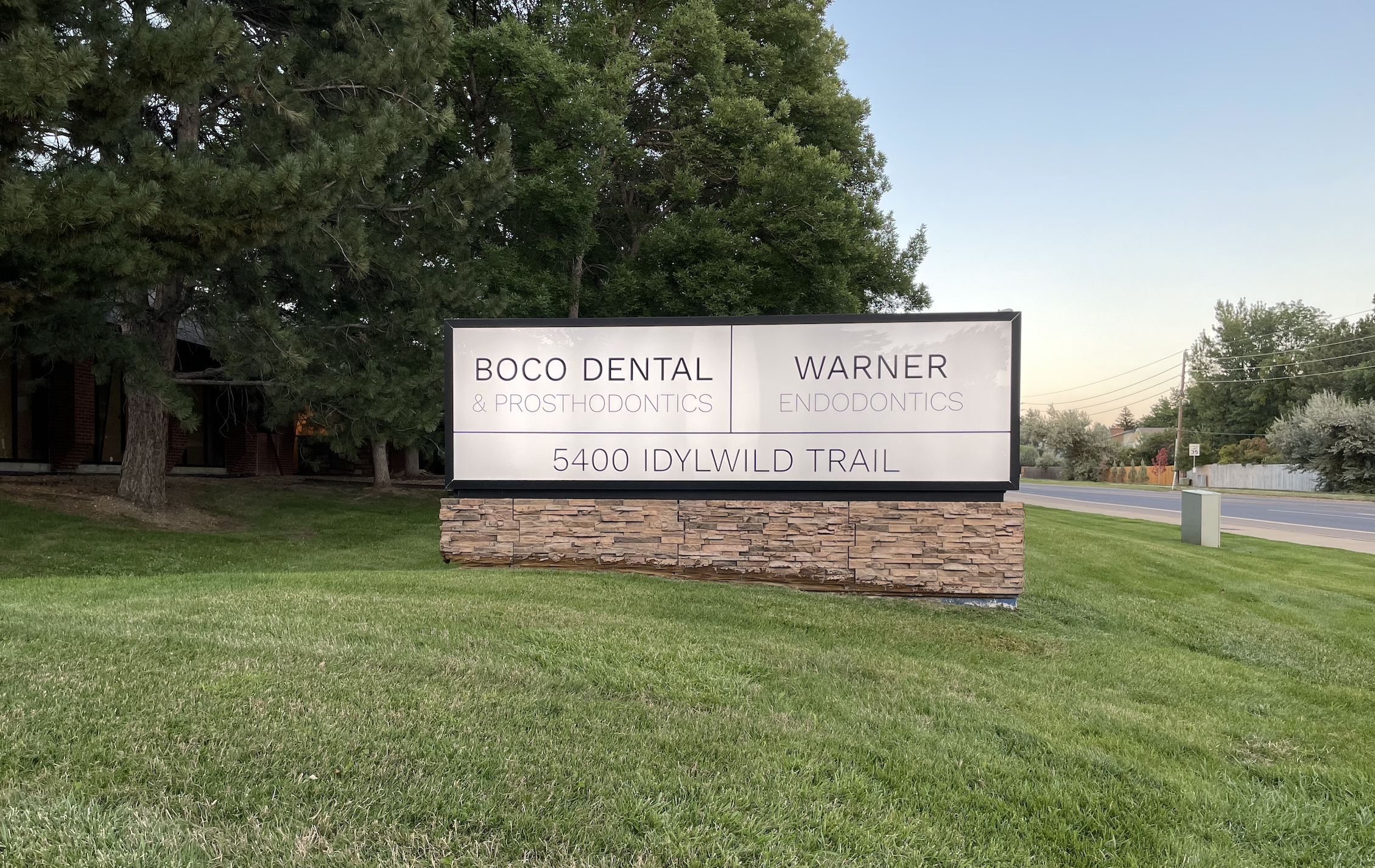New Office Location is Open!
We are pleased to announce that our new office is now OPEN! We are open Monday through Thursday and are ready to serve your patients!
We are located at 5400 Idylwild Tr, Suite C in Boulder (cross street at Lookout Rd).
We are pleased to announce that our new office is now OPEN! We are open Monday through Thursday and are ready to serve your patients!
We are located at 5400 Idylwild Tr, Suite C in Boulder (cross street at Lookout Rd).

We are excited to report that the brand new office location will be ready next month. The development of the site is moving along swiftly and we can’t wait to get into our new digs! The office will be state-of-the-art with all of the comforts and conveniences you’d expect. We will be moving 1/2 mile to the west onto the corner of Lookout Road and Idylwild Trail. Come back for more updates.
It does not have to be a major injury to cause lasting damage to your tooth or teeth. It is advisable to have the tooth or affected area checked out as soon as possible following an injury.
Crown Fracture - may involve only tooth structure or it may expose the pulp (nerve) of the tooth.
Root Fracture - complete or partial fracture within the root of the tooth.
Concussion - think of a bruise on the tooth. There is no displacement or mobility but there is pain upon touching the tooth
Subluxation - injury that results in mobility of the tooth without displacement. The tooth may be painful to touch and will also have some wiggle to it
Luxation - injury resulting in displacement of the tooth. The displacement can be lateral, intrusive, or extrusive.
Avulsion - complete loss of the tooth (knocked out).
An endodontist may not always be the first person to manage the emergency treatment of the trauma (i.e. replanting, repositioning, or splinting a tooth), but they should be consulted ASAP after an injury. Timely management of dental trauma can help save a tooth and avoid unnecessary damage. Consultation with an endodontist should be done within 1 week of the injury.


Tooth Savers
If your tooth has been recommended for extraction, have you consulted with an endodontist to determine if it could be saved?
Thanks to Emily Starks @ Starks Design Company for providing a great new look for Warner Endodontics!


In the fall of 2016, Dr. Warner successfully completed the board certification process and was named a Diplomate of the American Board of Endodontics. Only about 1 in 5 endodontists nationally are board-certified. In New York City, the percentage of boarded endodontists is even lower. Achieving Diplomate status requires dedication to the profession of endodontics, excellence in patient care, a high moral character, and the pursuit of continuing education in the field.
If you are not informed about what to expect following a filling, you may be alarmed if your tooth suddenly becomes symptomatic after a filling. Many times patients complain that they had no pain before a procedure and their sensitivity to cold began immediately after the filling. It is not uncommon to have sensitivity to cold after a filling, and it can be completely normal. When a cavity is removed from a tooth, the pulp tissue (nerve) can become temporarily inflamed. When the pulp becomes inflamed, it can respond to cold stimuli more rapidly and with hypersensitivity. As long as the sensation is short lasting and only when provoked, you should expect the symptoms to subside within a few days. The inflammation of the pulp in this case is reversible and no further treatment is required.
If you are having prolonged hypersensitivity, such as pain to cold that lingers for 30-60 seconds, or the pain is spontaneous without provocation, the pulp may be irreversibly inflamed. A pulp with irreversible inflammation is incapable of healing and requires root canal therapy.
Scientific research is the foundation for which dental and medical treatments are based. Evidence-based dentistry is the practice of performing treatment shown by the literature to be of a particular benefit to the patient. Providing dental treatments based on anecdotal evidence not supported by scientific research can be ineffective and dangerous.
When reading scientific research, it is important to not take anything at face value. The type and design of the study has huge implications on the validity of the conclusions presented. Well-designed randomized clinical trials have the highest level of evidence due to their strict control of variables. Animal studies have a lower level of evidence due to their questionable application to human beings.
One study design that seems to present very convincing conclusions, but must be carefully considered is the cross-sectional study. These studies are most often surveys asking people a series of questions. They can be used to establish a correlation between two or more factors, such as eye color and whether or not you own a motorcycle. Perhaps more people with brown eyes own a motorcycle than people with green eyes. Although a trend may be seen in the data, it does not mean that there is a causative relationship between the factors.
The findings of these studies are passed off as facts and widely distributed throughout the media and internet. Without well-designed research examining these possible relationships, no causation can be established. Accepting survey data as fact can lead to potential harmful situations, such as when a patient declines certain dental medical treatment in lieu of unproven remedies.
John Oliver makes some good points:
John Oliver discusses how and why media outlets so often report untrue or incomplete information as science.
To extract or not to extract? This is the question that faces many teeth that fail to heal following root canal treatment. It is less likely that an implant would be recommended for a tooth requiring a first-time root canal, and more likely for a retreatment. Because implants are gaining much popularity of late, they have become the preferred solution to a failing root canal. Some dentists may consider root canal retreatment too complicated, unpredictable, or unsuccessful to recommend. The truth is that retreatment can be a very successful procedure, 80-90% on average. When there is a clear cut reason to explain why a root canal is failing, such as a missed canal, a poor root filling, or root canal recontamination through a leaking restoration, there is a great possibility that the retreatment will remove the source of the infection and allow the tooth to heal. Some retreatments may not be as predictable, such as those with separated instruments, canal blockages, or root perforations. Apical surgery may be an option for the more complicated retreatments. Sometimes it is not advisable to perform a retreatment due to a poor prognosis, and an alternate treatment should be done. Implants are an excellent option for replacing missing teeth, but they should only be considered if it has been determined that extraction is necessary. Both root canals and single-tooth implants share the same survival rate of about 94%. However, implants have been shown to require more treatment intervention to maintain their survival rate. They also require more time to function than a tooth receiving root canal therapy, meaning that it can take a significant amount of time before you can use your implanted tooth. There are many factors that must be evaluated to determine the treatment that's best for your tooth. If your tooth has been recommended for extraction and implant, ask if root canal is an option.
It always begins the same way: I have nothing against you, but I hate the dentist. There is no doubt that the word "dentist" conjures up feelings of anxiety and fear within certain patients. Most of the time, the fear originates from a negative dental experience many years in the past. Unfortunately, despite the advances in dentistry, the dental profession has not yet been able to completely extinguish these feelings of fear and anxiety. It is not surprising that root canals top the category of most feared dental procedures, when it should in fact be considered the most misunderstood procedure. Pain is often associated with root canal treatment, but it is usually the pre-operative pain of which is being regarded. There is no reason why a root canal procedure cannot be performed 100% pain-free. Patients must be reminded that the purpose of a root canal procedure is not to cause pain, but rather to relieve it, and many patients will attest to near immediate relief of pain following a root canal. Hopefully with each passing painless dental procedure performed, the level of fear and anxiety in patients is gradually elimitated.
The AAE has just released its revamped endodontic surgery video. The video explains the reasons for apical surgery and how it is performed.
Learn how endodontists perform surgery to treat an abscess or infection and save your tooth.
You may ask how can a tooth survive in the body when it's dead. It is true that root canal therapy involves removing the tissue from within the roots, but it does not "kill" the tooth. The tooth is still connected to the bone by a ligament, called the periodontal ligament. That ligament is rich in blood and nerve supply and continues to provide the tooth with a tactile sense (proprioception) even after root canal treatment. A true "dead" tooth would be rejected by the body.
To all our dental colleagues, take a look at the endodontics case assessment form. If you believe the endodontics case you are facing checks out as moderately or highly difficult, please consider referring the patient. We can help relieve you of the stress of handling a difficult case and help provide the patient with the best outcome.
When presented with tooth extraction as a solution to a dental problem, be sure to gather all the facts. Ask your dentist if root canal therapy is an option to save the tooth. Extraction sounds like the quick and easy treatment to address a toothache or broken tooth, but often times it results in more treatment time and expense.
The AAE recently released the following video to help answer questions regarding root canal safety. The safety of root canal therapy has been challenged on the internet, and the truth is that root canal treatment is a perfectly safe procedure that has never been shown to cause disease. Please view the following video and visit the AAE website for more information regarding root canal safety and other facts about endodontics in general.